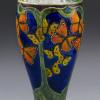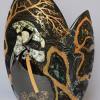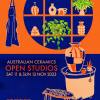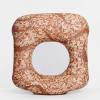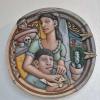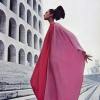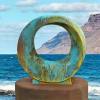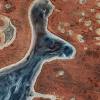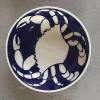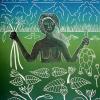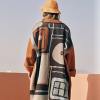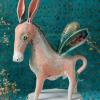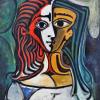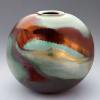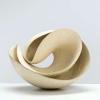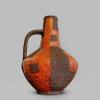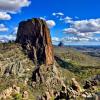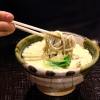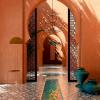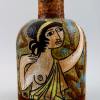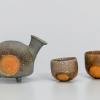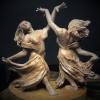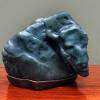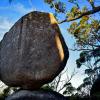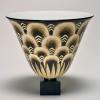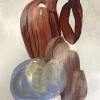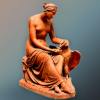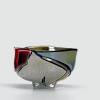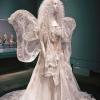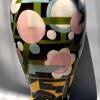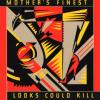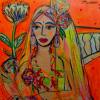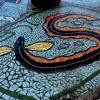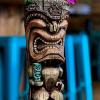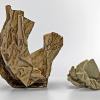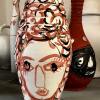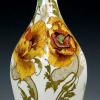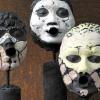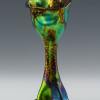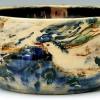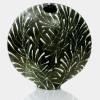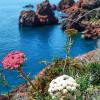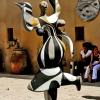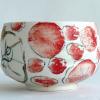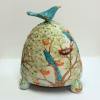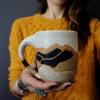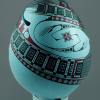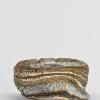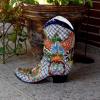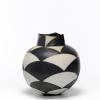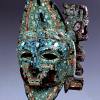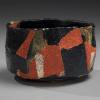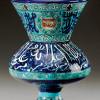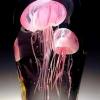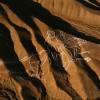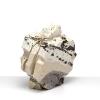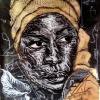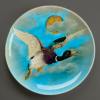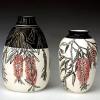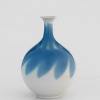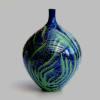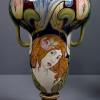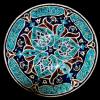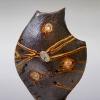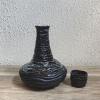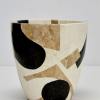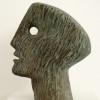Ceramic Dragon Art
 Dragon motif baluster vase
Dragon motif baluster vase
It is auspicious to honour the magnanimous dragon in a Dragon Year. As it’s a Water Dragon in 2012, and many other harmonic forces are aligning too, such as Neptune and Uranus in Pisces ( a powerful water aspect ), intuitive and artistic inspiration will be well aspected, especially with the abstract and impressionistic.  The dragon is a mythological animal of Chinese origin, and a member of the Naga (Sanskrit) family of serpentine creatures who protect Buddhism. Japan’s dragon lore comes predominantly from China. Images of the reptilian dragon are found throughout Asia, and the pictorial form most widely recognized today was already prevalent in Chinese ink paintings in the Tang period (9th century AD). In contrast to Western mythology, Asian dragons are rarely depicted as malevolent. Although fearsome and powerful, dragons are equally considered just, benevolent, and the bringers of wealth and good fortune. The dragon is also considered a shape shifter who can assume human form and mate with people. The Dragon has the head of a camel, horns or a deer, eyes of a hare, scales of a carp, paws of a tiger, and claws resembling those of an eagle. In addition it has whiskers, a bright jewel under its chin, and a measure on the top of its head which enables it to ascend to Heaven at will. This is merely a general description and does not apply to all dragons, some of which have heads of so extraordinary a kind that they cannot be compared with anything in the animal kingdom. The breath of the Dragon changes into clouds from which come either rain or fire. It is able to expand or contract its body, and in addition it has the power of transformation and invisibility. In the Ming and Qing dynasties (1368–1911), only the imperial family was allowed to use dragons to decorate their homes, furniture, and clothes. The dragon is the only mythical animal among the twelve zodiac animals, bringing special auspices to the year of the dragon. In addition, the dragon is believed to possess supernatural powers such as controlling the rain. As a result, it is one of the most popular themes for Asian artists.
The dragon is a mythological animal of Chinese origin, and a member of the Naga (Sanskrit) family of serpentine creatures who protect Buddhism. Japan’s dragon lore comes predominantly from China. Images of the reptilian dragon are found throughout Asia, and the pictorial form most widely recognized today was already prevalent in Chinese ink paintings in the Tang period (9th century AD). In contrast to Western mythology, Asian dragons are rarely depicted as malevolent. Although fearsome and powerful, dragons are equally considered just, benevolent, and the bringers of wealth and good fortune. The dragon is also considered a shape shifter who can assume human form and mate with people. The Dragon has the head of a camel, horns or a deer, eyes of a hare, scales of a carp, paws of a tiger, and claws resembling those of an eagle. In addition it has whiskers, a bright jewel under its chin, and a measure on the top of its head which enables it to ascend to Heaven at will. This is merely a general description and does not apply to all dragons, some of which have heads of so extraordinary a kind that they cannot be compared with anything in the animal kingdom. The breath of the Dragon changes into clouds from which come either rain or fire. It is able to expand or contract its body, and in addition it has the power of transformation and invisibility. In the Ming and Qing dynasties (1368–1911), only the imperial family was allowed to use dragons to decorate their homes, furniture, and clothes. The dragon is the only mythical animal among the twelve zodiac animals, bringing special auspices to the year of the dragon. In addition, the dragon is believed to possess supernatural powers such as controlling the rain. As a result, it is one of the most popular themes for Asian artists.

Mid 15th Century Porcelain Dragon Ewer (Vietnam)
Associated with the aquatic aspects of creation, dragons are central themes in Vietnamese cosmology and it was believed that fish of great age transformed themselves into dragons capable of flight. The Ly dynasty named its capital Thang Long or ‘rising dragon’, ( Art Gallery NSW )
A ceramic tile mural of a mythical dragon in Beijing. It’s called the Nine Dragon screen.
Descending Dragon, Hanoi, Vietnam. ( Wonderfully animated ! )
 Gold dragon on red glaze vessel
Gold dragon on red glaze vessel
 Dragon Handled incense censer
Dragon Handled incense censer

Takht-i Sulayman, Iran, 14th century. Il-khanid period.
Rare 1950s Japan Dragon Ceramic Plate
Japanese Dragon Oil Burner
 Ceramic Dragon Egg, 18 inches high. Unfortunately, to the dismay of the owner, they were stolen. ( frogspondrock.com )
Ceramic Dragon Egg, 18 inches high. Unfortunately, to the dismay of the owner, they were stolen. ( frogspondrock.com )
 English Wedgwood Cobalt Blue 8 sided bowl
English Wedgwood Cobalt Blue 8 sided bowl

English Wedgwood Cobalt Blue “Dragon Lustre” Bowl, 1920.
Hanoi green dragon Green dragon entrance
Green dragon entrance
The 37m long ceramic dragons, which were registered for the Vietnam Book of Records, were moved and set up on West Lake, Hanoi, on January 3 to celebrate the Lunar New Year Festival.
The 9 metre tall dragons, made by craftsmen from Bat Trang Ceramic Village, had been displayed at the Bach Thao botanical gardens to mark the 1,000th anniversary of Thang Long-Hanoi.
According to cultural researchers, dragons should be located at solemn places close to water and historical relics and West Lake was the most suitable area.
 Black dragon on yellow vase
Black dragon on yellow vase

Pair Of Plain Tri-colored Porcelain Gu-shaped Vases with a Dragon Pattern, Qing Dynasty: Kang Xi Imperial Ware
A glazed model of a dragon roof tile, China Qing Dynasty. Nagel
 Tomb of Emperor MinhMang ,Vietnam ( Richard-Seaman .com )
Tomb of Emperor MinhMang ,Vietnam ( Richard-Seaman .com )
Choson Dynasty Dragon Jar -The short-necked, inverted pear-shaped Eighteenth Century jar is 19 inches high and decorated in brilliant cobalt blue with scrolls and a unique vigorously drawn five-clawed dragon. It was sold to a collector in 2002 for $1.2 million. This price was Butterfields’ highest selling singular lot in its 137-year history at the time.
Japanese Dragon Tattoo
Giant Sea Dragon – Crosby, Mn
 ‘Panlong vase’ by designer chen-hsu liu and craft artist shi-ren lu working with traditional koji ceramic and contemporary shapes. Taiwan
‘Panlong vase’ by designer chen-hsu liu and craft artist shi-ren lu working with traditional koji ceramic and contemporary shapes. Taiwan
Badge (Lizi) of the Imperial Prince with Dragon, China, late Ming dynasty (1368-1644), mid-seventeenth century.
( LACMA )
 http://ceramicemporium.wordpress.com/
http://ceramicemporium.wordpress.com/
Dragon ceramic ginger jar
Scrafitto Dragon decorative vessel
Photo (c) Overstock.com
Dragon Incense Pot
Charlotte Rhead Tube Lined Manchu Dragon Charger
Chinese copper dragon teapot
Chinese porcelain blue & yellow dragon vase
Dragon Moriaga Hand Painted coffee pot
Chinese blue white dragon teapot
Japan Vase with Everted Fluted Lip and Raised Dragon Decor, 19th century Ceramic, Hirado ware; porcelain with underglaze blue.
( LACMA )
Ceramic vase with dragon handles and molded design covered in a mustard yellow and green glaze over a red clay body.
( Cowan Auctions )
Amphora dragon vase
Antique Chinese Qing Dynasty Period hand painted black and gilt vase depicting dragon and fish.
Antique Nippon Moriage Dragon Vase
Chinese Blue and White Vase
Chinese dragon celadon porcelain vase.
( Liveauctioneers )
Chinese Qianlong tall vase, the vase with detailed 5-toed dragon chasing the flaming pearl of wisdom.
Qing dynasty dragon vase
Chinese Dragon Teapot
 Green Dragon
Green Dragon






























